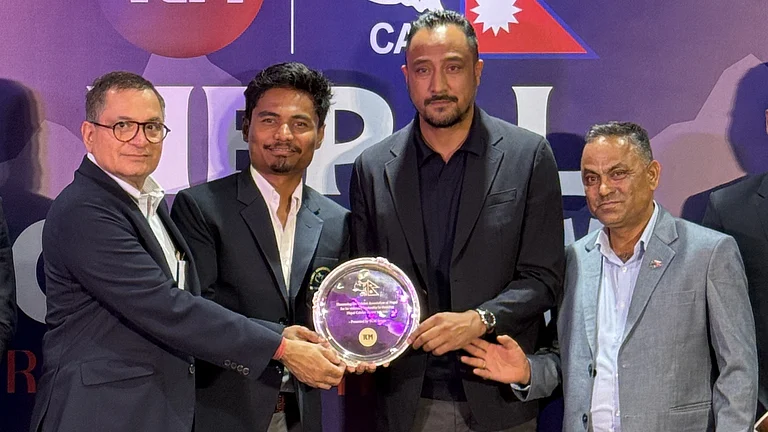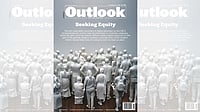I was the fall guy. If even a minor epidemic broke out after a year, it was my neck on the chopping block," shudders S.R. Rao, Surats municipal commissioner, who is responsible for its new ranking as the second cleanest city in India. Posted to the plague city in May 1995, Rao had his job cut out for him: to prevent a recurrence of the epidemic and to prepare the city for the hordes of journalists who were bound to descend on Surat to cover the plague outbreaks first anniversary.
No wonder he got down to business right away. Not with brooms and vacuum cleaners, but with a vengeance most untypical of the countrys present-day IAS officers. "Bureaucratically, it was a suicide posting. I had little option but to clean up the city on a war-footing," says the 42-year-old officer, who joined the civil service in 1978. A war, at times, was quite literally what Rao had on his hands. Amidst threats to his life and the ubiquitous pressure from politicians and their cronies, Rao generated extreme reactions. The hatred he evoked among builders, contractors and various other vested interests probably only matches the respect and admiration he received from Surat residents and the slum dwellers.
In fact, in one-and-a-half years, Rao Sahib has virtually attained the status of a demi-god. Between requests for autographs and photographs for posterity, his sheer presence make Suratis go for the broom. Or bend down to retrieve a Pan Parag wrapper or a cellophane foil from the street. During Raos tenure, the Surat Municipal Corporation has ranked first in the state in terms of recovery of taxes, in octroi collection and in tree plantation. And last fortnight, when the Indian National Trust for Architectural and Cultural Heritage ( INTACH) declared Surat the second cleanest city in the countryafter Chandigarhthe pride of the Suratis naturally turned into adulation for Rao. Coping with mass adulation is, however, the least of Raos problems. Changing peoples habits is. Says he: "One of Surats well-known poets, Bhagwati Kumar Sharma, maintains that a lack of hygiene among the city residents has something to do with their genes. I intend to prove him wrong." Easier said than done. But the science graduate from Vijaywada who completed his post-graduation in applied psychology from Vishakapatnam University decided to convert Surat into his laboratory.
Realising that his first task was to restore the faith of citizens in the Surat Municipal Corporation, Rao applied all his psychology insights to the hilt. Christening the operation "AC to DC", he told his officers to get out of their air-conditioned (AC) chambers to accomplish their share of daily chores (DC). And so, officers from all the six zones of the city would start their day at 7 am and supervise sweepers and cleaners on Surat streets. "Apart from a feeling of camaraderie amongst my colleagues, this also helped us gain field reality: a sweeper cant ask a millionaire to remove the car hiding garbage or a hotel owner not to throw foodstuff on the roads," Rao explains.
Armed with the experience gleaned from these early morning excursions, Rao set up another pop psychology experiment: to attack the richer among the populace first. Unauthorised structures have long been a part of Surats skyline while illegal encroachments have been the order of the day. And most big builders tend to flout all civic norms in their greed for quick profits. "I decided to give them advance notices before pulling their structures down," says Rao. A couple of such demolitions were enough to dent the clout of the high and mighty. A powerful local MLA, who moved around with gun-toting thugs, was among the first to be hit when his multistoreyed building was brought down without much fanfare.
After that, all persons whose pending municipal taxes exceeded Rs 1 lakh were targeted. From there on it was a cakewalk. Smalltime shops, residential buildings, temples and mosques which had encroached on government land started toeing the line. "Once they realised that the rich have not been spared, the reaction from the rest was nothing short of a miracle," says Rao. The local press, which had been relentlessly targeting the corporations failures, suddenly took notice. And another exhibition of Raos blatant disregard for financial and political power made him a hero among the vigilant local press.
MANY of the shops on the main arterial road readily agreed to break down the encroachments to widen the roads. When the corporation put yellow lines demarcating encroachments, Rao was showered with petals, coins and written agreements permitting the demolition. "Why, even the mosques and temples voluntarily broke down their encroachments. Several demolished the structures at their own cost. In fact, I am still trying to figure out the reason for such enthusiastic response," wonders Rao. Adds Ajaybhai Choksi, secretary of the corporations standing committee: "Raos biggest success has been to inculcate a spirit of integrity and a zeal for cleanliness, not just among the corporation staffers, but also in the citizenry of this 300-year-old city."
Rao appears genuinely thankful to the local press which, he says, has inexorably fulfilled its watchdog role. An admitted introvert, Raos frankness is nonetheless laced with a smattering of media-savvy jargon, which endears the media while it beguilingly helps him achieve his purpose to send out the message loud and clear: shape up or ship out.
Concurrent with the cleaning up of the main city, Rao also started rinsing the corporations own dirty linen. And the stains were not easy to remove. "Do you remember how the Godfather threatens in Mario Puzos book?" he suddenly asks, referring to the spate of resignations that followed his initial months. "Very pleasantly, over a cup of tea, I had to accept the resignations of several officers. And I am still not convinced that we have totally weeded out all corruption," he observes.
Among some of the innovative moves devised by Rao is one that stipulates a written explanation if a construction job cannot be undertaken within six months. "The rule is that the explanation has to be typed single-space in six fulscap sheets without any margins. Often contractors and officers-in-charge find it less painful to complete the job in six months than bother writing an explanation," he smiles.
In 1990, the corporation built a school at the rate of Rs 250 per square ft. The project took four-and-a-half years that included an 18-month time over-run. In 1996, under Rao, another school was built with the same specifications within six months. Its production cost this time was Rs 219 per square ft, inflation notwithstanding. "And the only criticism one corporator had to make in the last general body meeting was that I had used too much steel in the structure," he comments wryly.
The municipal commissioner has also established unit rates for specified construction works. Not only has it shortened the time lag between planning and execution, it has also reduced corruption considerably. "Now we have 14 tenders for a project that earlier would attract only two, and both with the same bids," he notes.
The results are evident. A city, where the migrant labour population is growing by 15 per cent each year and where 60 per cent of the residents are slum-dwellers, has suddenly discovered the pleasure of organisation. "Talking about any civic amenity in isolation does not make sense. If sanitation and public health engineering go hand in hand, town planning and slum upgradation follow close behind. Roads, schools, hospitals, and tax collections are all intrinsically interlinked to civic services," points out Rao.
The gutters have been cleaned and covered. Roads and streets have been broadened and paved all overin the residential areas, the shopping centres and even the red light street close to the Surat municipal office itself. If nature has burdened Surat with black dust in profusion, Rao has given the city its streets free of junk and garbage, its slums pay-and-use Sulabh toilets and a cleaner environment, its shops mandatory dustbins and penalty, also known as administrative charges, for default.
But most of all, he has given the citizens of Surat a pride that would have been unimaginable before his tenure. An international pariah just two years ago after the pneumonic plague outbreak, Surat today may yet find it difficult to host the Miss World Pageant, but it sure can prove to be a case study for hundreds of cities within the country and outside. Rao appears a bit fazed by all the attention and adulation. "I am not a social reformer," he says disarmingly. "I am just following orders."
Maybe with a vengeance, but whos complaining. Except, perhaps, Rao himself who claims he has no special attachment for the job. "Ill probably send my fourth transfer request today," he quips. "In the service, a field posting is considered lucrative. After more than 17 years of field duty, I would now prefer a secretariat posting. But neither do I have a brilliant academic record nor can I boast of any political patronage."
Perhaps with two daughters, aged 7 and 12, living in Hyderabad with their mother, Rao would like to be posted at the state capital with regular job hours and his family around him. But maybe his own reputation has preceded him. Way back in 1982, when Rajkot was burning in the wake of the then municipal commissioner, S. Jagdishans transfer, Rao was asked to replace him overnight. "Even then I managed to lay a 63-km water pipeline to Rajkot within six months," he says. And after completing a Department of Atomic Energy deputation in Hyderabad, when he was posted as the joint managing director of the Gujarat Industrial Investment Corporation (GIIC) at Ahmedabad, he felt he had earned the capital posting. Till the new BJP government in 1995 decided to send him to Surat.
Suryadevara Ramachandra Rao has more than proved his point. But a certain angst remains. Whether it is a prelude to a possible lucrative assignment in the future is a question probably he too wouldnt be able to answer. "Id ideally like to complete at least 20 years of service to avail of the pension benefits," he says. While he would prefer farming to administrating, the credentials he has gained at Surat may well throw him into another heady orbit from which escape might not be that easy. Or that attractive.


























